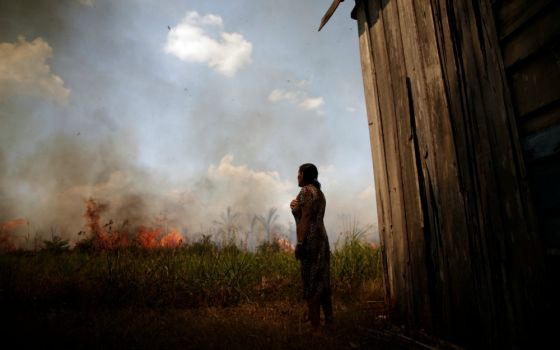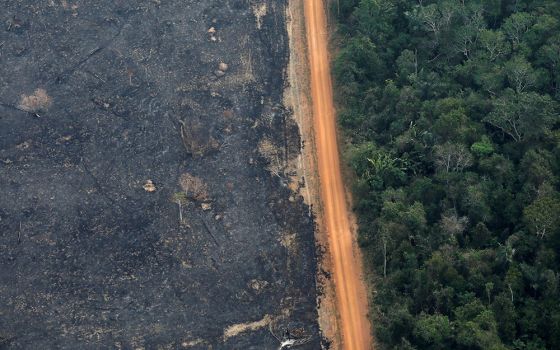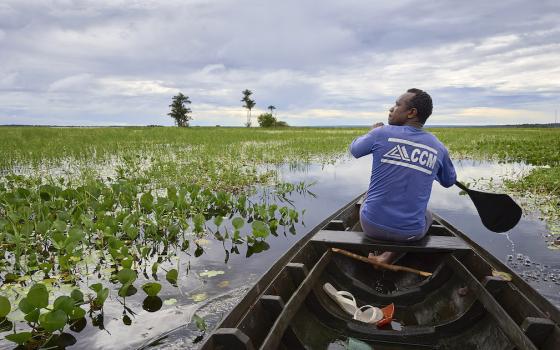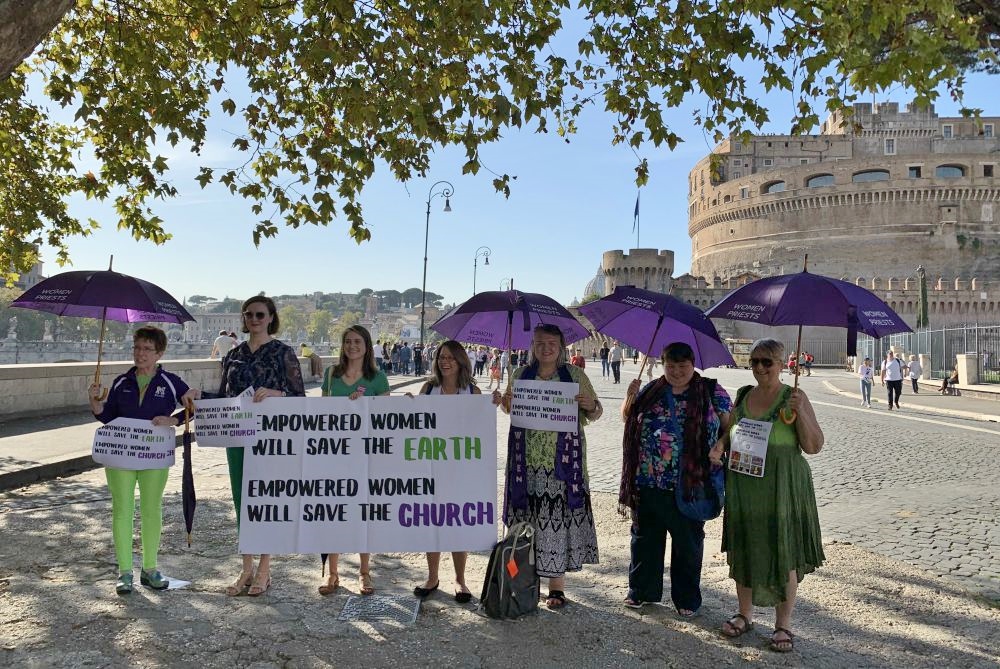
Leaders of Women's Ordination Worldwide offered a witness for women's equality outside of the Castel Sant'Angelo in Rome. They wore purple and green outfits to symbolize justice for women and for the Earth. (Jamie Manson)
In the final days of the Amazon synod, there was a small protest in front of the Castel Sant'Angelo. Seven members of Women's Ordination Worldwide (WOW) held a banner the read: "Empowered women will save the church; empowered women will save the earth."
I, of course, know these women and their Roman witnesses well. I have walked in protest with them along the Via della Conciliazione and, last year, captured their clash with the Roman police when they stood outside St. Peter's Square boldly demanding that women have a vote at the synod.
Though this year's witness was briefer and less dramatic than in years past, their message spoke a truth that was sometimes hinted at, and most times avoided, during every press briefing I attended during the synod.
These women made a crucial connection that most synod participants were either too afraid or too oblivious to make. Namely, that the cultural genocide inflicted on the indigenous, the unique suffering of women in the region, and the catastrophic destruction of the Amazon were all rooted in the patriarchal belief in the superiority of men.
"[T]he call for ecological justice … cannot be separated from the call for spiritual and sacramental equality," said WOW in a statement.
They are exactly right. Though the word "patriarchy" often raises hackles or inspires eyerolls, its definition is quite simple. Patriarchy is any system in which men hold the power and women are largely excluded from it. In a patriarchal structure, powerful men dominate women, children, nature and sometimes other men.
The subjugation of native peoples and the effort to erase their cultural identity, their traditions and practices, and their ancestral lands are all rooted in belief of the superiority of white males.
The disproportionate levels that women suffer from poverty, violence, abuse and lack of education is a direct consequence of sexist ideology.
The ravaging of the life-giving resources provided by our Earth is a direct result of the patriarchal idea that men are entitled to total dominance over nature for their own gratification.
In my time in Rome last month, I frequently heard the synod fathers lament the degrading treatment of the Amazon and the indigenous in the region, particularly women. Yet none of them seemed conscious of the fact that at the root of all of this suffering is the fundamental idea that men and women are not equal — the very ideology they perpetuate in their rigid insistence that women are not worthy of ordination, leadership and decision-making power in their own church.
Advertisement
As Miriam Duignan, a spokesperson for WOW, said succinctly, "The consequences of this massive injustice are far-reaching beyond the church."
Of course, it's not that women at the synod — who, in a glaring act of patriarchy got a voice, but not a vote at the gathering — didn't repeatedly offer hints and reminders.
On the same day of the WOW protest, Judite da Rocha, Brazil's national coordinator for the Victims of HydroElectric Dams, offered comments at the Vatican's daily press that clearly made the connection between sexism and the treatment of Amazonian women and lands.
"There is the sense that men take care of the Earth and women take care of the details," said da Rocha.
She said that this disparity in roles engenders domestic violence, sexual harassment and exploitation.
"Women and their work are taken for granted," she said, and often they do not even earn a wage for their labors.
At a press briefing the following day, Sr. Roselei Bertoldo spoke about her work with women who are trafficked, another scourge that women and children endure as a result of the patriarchal belief that their bodies exist for men's gratification.
During the question-and-answer period, her prophetic voice emerged, as she told the media that "those who go to the remotest places in the Amazon, who allow the evangelization process to take place are women."
The voice that women were given in this synod "is not the result of our silence," she said.
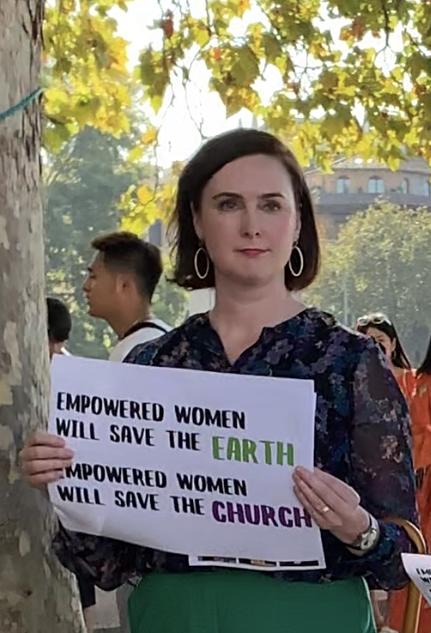
Miriam Duignan, spokesperson for Women's Ordination Worldwide, holds a sign in Rome during the final days of the synod on the Amazon. (Jamie Manson)
"We are the church, and we make the church," she continued, "We ask to participate more efficiently at the decision-making level. We are starting this journey. We won't be quiet; we want space, and we are starting to build that space."
Bertoldo, a Missionary Sister of the Immaculate Heart of Mary, said that they try to carry out their ministry with men, but "in some areas there are openings, in other areas there are less."
This sister was saying inside the synod hall what the women of WOW were saying outside of its walls.
"There would be no church in the Amazon if not for women," Duignan said. "It is a matter of urgent justice that the role that women are playing is recognized."
Though some of the clerics at that same press panel, such as Bolivian Bishop Ricardo Ernesto Centellas Guzmán and Indian Cardinal Oswald Gracias, spoke to the need for increased participation of women, none of them gave the sense that women would or should be seen as equal in the eyes of the church.
These small openings given to women in the press briefings were writ large in the final synod document, which recommended the ordination of married men in the Amazon region, but continued to dither on whether the diaconate for women should be reinstituted. That question will have to go back to the drawing board. Pope Francis, in off-the-cuff remarks after the synod, said he would "try" to regroup his commission on the study of the history of women deacons.
It is little wonder, of course, that married men received some justice at this synod, while women were told once again to wait and be patient while men deliberate and decide their fate. If any woman had been given a vote, would this have been the result?
The workings of this synod were, in at least in one way, a perfect reflection of why women continue to suffer in the Amazon.
In the same way women's work on the land is taken for granted and exploited with lack of wages, women's work of building up the church is exploited by men who refuse to recognize their work for the priestly ministry it is.
Though there were some signs of hope in the inclusion of women's voices and the acknowledgment by some men that women need greater participation in the church, this year's synod compels us to ask: Can the Catholic Church truly help the people of the Amazon break free of discrimination, oppression and gender-based violence if it continues to replicates the same fundamental, patriarchal model of injustice in its own structures?
[Jamie L. Manson is NCR books editor and an award-winning columnist at the National Catholic Reporter. Follow her on Twitter: @jamielmanson.]
Editor's note: We can send you an email alert every time Jamie Manson's column, "Grace on the Margins," is posted to NCRonline. Sign up here.





